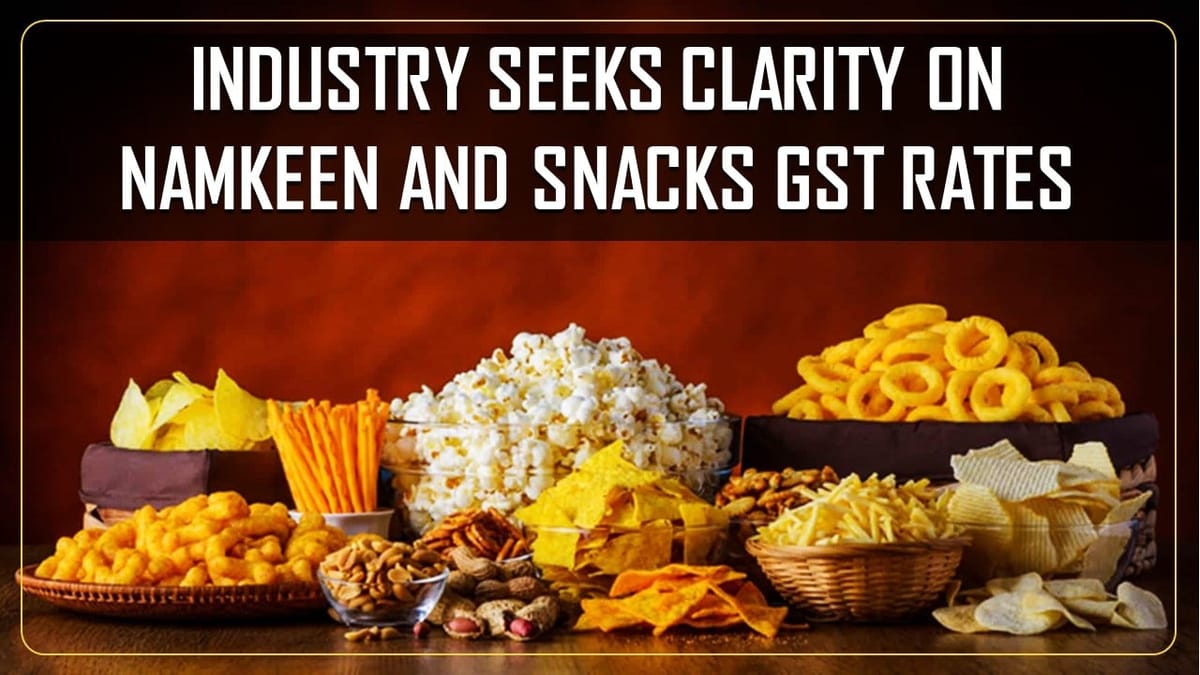Priyanka Kumari | Oct 28, 2023 |

Namkeen and Snacks Industry players seeks clarity over Classification and GST Rates
The Goods and Services Tax (GST) rates are causing confusion in snacks and namkeens products. After a large number of DGGI notices, the snacks industry is now looking for clarity from the government on the status of namkeen, fryums, and snacks.
According to a source, the Directorate General of Goods and Services Tax Intelligence (DGGI) has issued notices to industrialists requesting GST at 18%. The industry is considering that namkeen and related snacks should be treated at 12% GST under HSN Code 2106 and 5% GST on uncooked and unfried snack pellets.
The industry’s point of view is based on the 2012 Supreme Court ruling in an excise regime-related case on Kurkure between the government and Pepsi Foods Ltd, where the apex court categorized kurkure as namkeen. After this order, Pepsi Foods and other industry players have been filing 12% GST under the Namkeen category.
Further, the source added, DGGI keeping in mind that chips attract 12%, and other namkeen and snacks which are treated as fryums or snacks cooked and involved process of extrusion attract 18% GST.
Products included in the fryums or snacks cooked and involved in process of extrusion category such as Bhujia, Kurkure, Cheetos, select varieties under Bingo, etc, should be treated at 18%.
The classification of GST has been an issue for both the government and the industry. On January 2023, the CBIC circular clarified that snack pellets such as fryums, etc. going through the process of extrusion are to be classified under HSN Code 1905 and will attract 18% GST. After that, another circular issued in August 2023 said that uncooked and unfried snack pellets would attract 5% GST.
PepsiCo, Haldirams, ITC, Pratap Snacks, Bhikaji, Bikano, etc. industrialists have been affected.
The aim of the GST Council and the select committee report for rates was to impose a lower rate for food products. 18% GST for snacks which involves an extrusion process leads to doubtfulness in taxing namkeen and snacks. In simpler words, there is a lack of accessible differential to levy a higher rate of tax based on an essential process that is required to prepare such snacks.
One of the fastest-growing industries in India is the ready-to-eat food processing industry. Furthermore, the industry is very flexible and has a dynamic nature of product line therefore, it is subject to varied challenges under GST law, particularly classification.
The categorization and tax rate of some processed food items like namkeen, bhujia, snacks, and similar edible food items have been a controversial issue since the introduction of GST, and from time to time, many changes have also brought in the tax schedule regarding the same.
The law defines specific GST rates for namkeen, bhujia, chabena, and similar edible preparations (in packaged and labeled form, and otherwise) similar to un-fried/ un-cooked snack pellets.
However, there is an unclarity as to which all products would get categorized under these heads, for example, chips, packed samosa, mathri, etc. The industry has been adopting different tax positions in terms of tax rates for such items, analyzing the recipe, trade parlance, preparation method, etc., and has thus been conquered to scrutiny by DGGI authorities in the recent past.
Moreover, it is essential that definite clarification is provided by the GST council in terms of the classification and tax rates for the above ready-to-eat food processing items which shall provide adequate relief to the industry and settle the debate on this issue.
In case of any Doubt regarding Membership you can mail us at [email protected]
Join Studycafe's WhatsApp Group or Telegram Channel for Latest Updates on Government Job, Sarkari Naukri, Private Jobs, Income Tax, GST, Companies Act, Judgements and CA, CS, ICWA, and MUCH MORE!"